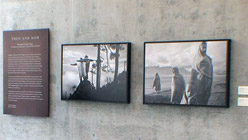View segment on Sebastião Salgado. Produced by Spark for This Week in Northern California. Original air date: October 2009. (Running Time: 5:37)
View Spark Web extra of Ken Light, the director of UCB’s Center for Photography, talking in detail about three of Sebastião Salgados photographs from the Then and Now exhibition at the David Brower Center. (Running Time: 8:06)
In an age of lightning-fast and celebrity-obsessed media, a time when a single subject can be photographed and transmitted around the world in mere moments, Brazilian photographer Sebastião Salgado stands out. Not only does the celebrated documentary photographer eschew commercial subjects for socially charged images of humans and landscapes shaped by socioeconomic and environmental injustice, but also he routinely devotes years to his projects, which often comprise hundreds of black-and-white images.
Selected for the inaugural exhibit at the new David Brower Center — a nonprofit center in Berkeley, Calif., designed to foster collaborations between organizations and individuals dedicated to environmental and social action — an exhibition of Salgado’s works, entitled Then and Now, unearths a wealth of imagery. It spans the nearly four decades since his wife, Lélia, who is the show’s curator, presented him with a camera as a gift in 1970. Then and Now includes selections from Salgado’s current project, Genesis, which was begun in 2004 and is scheduled for completion in 2011 and which emphasizes dramatic landscapes in locations ranging from the mountains of Ethiopia to the Galapagos Islands. “We needed ways to engage people in activism, and in my opinion, the arts are the best way to inspire people to think about the world in a different way,” says Brower Center executive director Amy Tobin.
Salgado has won widespread acclaim for his photographs — and not just from the art world. Championed by social change groups and nongovernmental organizations for his work reflecting struggling populations in developing regions of the world, Salgado is perhaps best known for photographing such subjects as manual laborers, refugees displaced by war or drought, and populations weighed down by famine in Africa and other nations. Organizations such as Doctors Without Borders, the World Health Organization, Amnesty International, and UNICEF regularly use his images in their work.
Not surprisingly, given the nature of his images, Salgado’s interests stretch beyond the art world and into activism. Since 1991, Sebastião and Lélia have been involved in restoration efforts in Brazil’s Atlantic Forest, threatened by logging and cattle grazing. In 1998, the Salgados founded the Instituto Terra to promote reforestation and environmental education in the forest, which has since been designated the first private nature reserve in Brazil.
Salgado was a trained economist who worked for the London-based International Coffee Organization before becoming a full-time photographer in 1973. In addition to being exhibited in more than 100 galleries and art centers around the world, many of his collections have been published as books, including The Other Americas (1986), Sahel: Man in Distress (1986), Workers: An Archaeology of the Industrial Age (1993), Migrations (2000), Sahel: The End of the Road (2004), and Africa (2007). Salgado is the recipient of numerous awards and honors, among them the World Press Photo Award, the Oscar Barnack Award, the Hasselblad Foundation Award, and the New York International Centre of Photography Award. He has also served as a UNICEF Goodwill Ambassador.
 Produced by Spark for This Week in Northern California.
Produced by Spark for This Week in Northern California.
Resources
- Array
- Array
- Array
- Array
Related Episodes
Sebastiao Salgado
The Sebastião Salgado segment was produced by Spark for This Week in Northern California.

